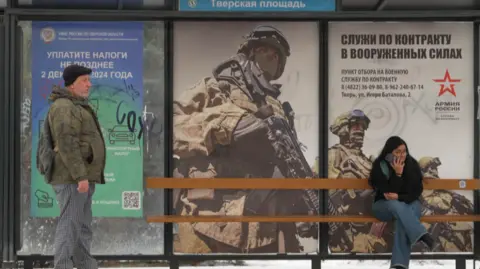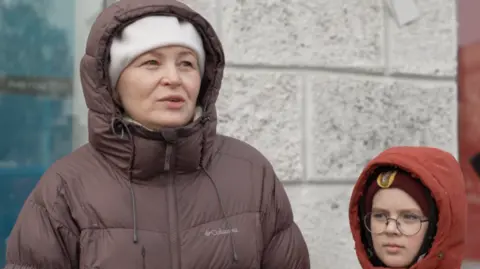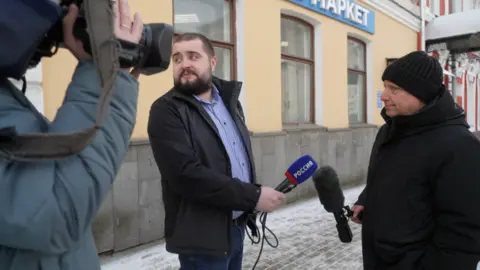Russia editor
 BBC
BBCDriving to TV, the first thing I noticed is the soldiers.
They are everywhere. On advertising panels, aspects of buildings, at bus stations. Pictures with the phrase “Russia's hero”. The stickers of the forces with Kalashnikov rifles that encourage the public to “love and defend” Russia and defend it.
In other words, to register, go and fight in Ukraine. Three years after its widespread invasion of its neighbor, Russia is looking for new recruits.
Despite all military images throughout the city, if you live in TV, it is possible to persuade yourself that life is normal. The front line is hundreds of miles away.
“See just around,” says Michael, a local teacher. “The cars pass and all the stores are open. There are no shells falling from anywhere. We are not panic. We cannot hear any sirens crying. We do not run to any evacuation points.”
For many Russians, they invaded Ukraine – what the Kremlin still calls a “special military operation” – is something they only face on their TV screens.
But for people like Anna, it is more realistic.

“I know many people who went out to fight,” says Anna when we talk to the street.
“Some of them are no longer home. I hope (the war) will end as soon as possible.”
Donald Trump claims that this is what he wants too. Without Ukraine's call to the negotiating table, the Trump administration has already entered direct talks with the Russian leadership.
What does the Russians make from the American president and his initiatives to Moscow?
“Trump is a dark horse,” Anna believes. “I am not sure what I expect from him.”
“We want the overall surrender to Ukraine”
Some of the people I am talking to in TV are the official narration they have heard over the past three years on the state TV: that their country is not the aggressor, and that Russia is defending, a minor.
This does not mean that Russian society as a whole buys this alternative reality.
“In a society that people always prefer to be in the main current,” Andre Kulsnikov, a column writer in Newtimes.ru and Novaya Gazeta. “If the main current is in support of the war and television says that we are in a war with the West, then the ordinary citizen will think of this. It is easier not to think about the details. You want to live in peace, so why don't you join the majority?
“Some researchers call this position the fetus. When you defend yourself from this unable to an interpretation, you look like a child. You say:” I cannot explain to myself what is happening. I think you are. You can feed me with words. “You will accept it.” This is typical for all societies of this type: a bit authoritarian, somewhat comprehensive. “
Larissa and her husband Valerie accept the official line.
“We are all for the special military operation,” Larissa told me. “We are ready to volunteer and go there ourselves!”
They did not, clearly.
“We hope (Russia) is victorious. We want the overall surrender to Ukraine.”
The police are attending. They have received a call to inform them that “people with suspicious appearance with a camera” wander. Meaning for us.

They are polite, but they want to know why we are here. They take a statement from our driver. They check our car. They ask me about an official explanation for our visit. Tell them that we measure the mood away from Moscow. We show our documents, which are in a state.
While we were talking to the officers, the Russian Camera TV crew photographed us.
The reporter says: “We were only going, and we discovered the police and confessed to you. Can you tell me what is going on?”
“I don't know,” answer. “Maybe you can tell us?”
“What were you photographing?”
“We were talking to people on the street,” I say. “I think we were allowed to do so.”
“Yes, in our country we have freedom of expression,” the reporter answers. “Perhaps the police just want to help you? It is uncomfortable to hear a Western TV that publishes fake news that there is no freedom to express in Russia. You are talking to people freely and no one is on your way.”
“Regardless of you,” I refer. “Police officers are standing next to our car.”

The accident, which lasted for about an hour, is not a real surprise. Three years of war fueled doubts from the West inside Russia. The early signs of ice melting in relations between the United States of Russia have not changed this yet.
From speaking to people in TV, it becomes clear that the Russians hope that the end of the fighting will lead to economic relief.
“The prices are now very high for the things I need more than others,” says Yulia, shaking her child to sleep in the kids. “Like the price of potatoes and onions. I really feel that.”
But teacher Michael does not feel that Donald Trump has any strategy to secure peace.
“Unfortunately, Trump had no plan,” Michael believes. “He is improvised. He does not know what he will do. My sympathy for him. I am happy because he won. But we are talking about this episode, we are all in the dark. And Trump is in the dark itself.”




